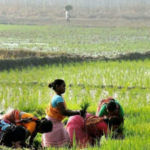Botswana threatens to send 20,000 elephants to Germany
What’s in this Article?
- Table of Contents
- Why in the News?
- Trophy hunting
- Botswana government charges fees for hunting elephants
- Reason for Large Elephant Population in Botswana
- Challenge with Elevated Elephant Numbers in Botswana
- Britain was also threatened to send 10 thousand elephants
- Measures Implemented to Decrease Elephant Population
- Advantages of Trophy Hunting
- Conclusion
- MCQ’s
Why in the News?
-
- Botswana’s threat – will send 20 thousand elephants to Germany: President said – they are crushing people; Germany had said – their hunting should be banned
- Botswana President Mokgweetsi Masisi has threatened to send 20 thousand elephants to Germany. He has said, ‘The people of Germany should also experience living together with elephants, as they are asking us to do. We want to give this gift to Germany and we will not hear ‘no’.
- In fact, earlier this year, Germany’s Environment Minister had raised the issue of elephant conservation. He had said that for this, some restrictions should be imposed on going to Botswana to hunt elephants and then importing them.
Trophy hunting
- Trophy hunting is a form of hunting for sport in which parts of the hunted wild animals are kept and displayed as trophies. The animal being targeted, known as the “game”, is typically a mature male specimen from a popular species of collectable interests, usually of large sizes, holding impressive horns, antlers, furs or manes. Most trophies consist of only select parts of the animal, which are prepared for display by a taxidermist. The parts most commonly kept vary by species, but often include head, hide, tusks, horns, or antlers.
- Trophies are often displayed in trophy rooms or game rooms, or by gun rooms along with the hunter’s gun collection.
- Trophy hunting has strong supporters and opponents. The controversy focuses on the morality of hunting for pleasure rather than for practical use, as well as questions about the extent to which big-game hunting benefits conservation efforts.
Botswana government charges fees for hunting elephants
- In fact, one-third of the world’s elephant population lives in Botswana. Their number here is more than 1 lakh 30 thousand. This is 4 times more than the population of elephants in India. People from Western countries, especially Germany, go to many African countries like Botswana to hunt elephants. For this, the governments here charge thousands of dollars in fees from hunters.
- This money is used for the protection of elephants and the livelihood of the local people. After hunting elephants, foreigners take their heads and skins back to their country as trophies. These are called hunting trophies.
However, many animal rights groups oppose this system and demand a ban on it.
Reason for Large Elephant Population in Botswana
- Elephant Safe Haven: Because of its tiny population of people and stable administration, Botswana has served as an elephant safe haven.
- Safe Environment: Elephants stopped crossing the Chobe River, opting to stay in the safer country of Botswana, following widespread poaching caused by violence in Namibia and Angola.
- Severe Conservation Policy Implementation: Botswana likewise put severe conservation policies into place. In 2013, as poaching occurrences increased, a strategy known as “shoot-to-kill” was implemented, aimed at suspected poachers.
- Trophy Hunting Prohibition: The nation has also outlawed trophy hunting, which was previously permitted with a formal government license.
- Elephant Population in Botswana: According to a report by Conservation Frontlines, the country’s elephant population increased from less than 10,000 at the beginning of the 1960s to over 80,000 by the mid-1990s.
Challenge with Elevated Elephant Numbers in Botswana
- Escalation in Human-Wildlife Encounters: Botswana’s burgeoning elephant populace has resulted in an uptick in conflicts between humans and animals.
- Trouble for Rural Areas: The elephant has emerged as a serious problem for the nation’s rural regions, frequently causing damage to residences, tapping into water supplies, ravaging crops, and causing fatalities by trampling people and livestock.
- Habitat Loss and Ecological Imbalance: An excessive elephant population also poses a threat to other species, leading to significant losses in biodiversity and habitat deterioration. For instance, elephants strip trees for sustenance and consume substantial water resources, contributing to the decline of non-elephant wildlife.
Britain was also threatened to send 10 thousand elephants
- Even in Britain, during the 2019 elections, PM Sunak’s Conservative Party had made the issue of banning elephant hunting in other countries a part of its election manifesto.
After this, in March this year, British MPs passed a bill related to banning trophy hunting. - On this, Botswana’s Wildlife Minister Mthimkhulu had threatened Britain last month.
He had said, ‘We send 10 thousand elephants to Hyde Park in London. With this, the people there will also know what it is like to live with elephants.
Measures Implemented to Decrease Elephant Population
- Elephant Transfers to Other Nations: Botswana has transferred elephants to various countries. For instance, Botswana provided approximately 8,000 elephants to neighboring Angola, and in 2022, it gifted 500 elephants to Mozambique.
- Reversal of Trophy Hunting Ban: Botswana reversed its ban on trophy hunting in 2019.
- Benefits of Reversing the Ban: This decision not only aids in managing the elephant population but also stimulates the local economy. Hunters, often from abroad, pay up to $50,000 for each elephant hunted. Trophy hunting injects $250 million annually into South Africa’s economy and supports 17,000 jobs.
Advantages of Trophy Hunting
- Advantage for Species: Authorities have contended that regulated trophy hunting ultimately benefits the targeted species.
- Assistance in Conservation endeavors: Governments can utilize funds from affluent hunters for conservation purposes and distribute profits to local communities, potentially curbing habitat loss and enhancing animal protection.
- Economic Gains: In eight primary African nations, trophy hunters contribute a maximum of 0.03 percent to the Gross Domestic Product (GDP).
Conclusion
- If countries want to ban trophy hunting, they need to have an alternative source of revenue worth hundreds of millions of dollars every year. Banning things without knowing the consequences is actually creating more problems for the species.
MCQ’s
Q. With reference to Indian laws about wildlife protection, consider the following statements:
1. Wild animals are the sole property of the government.
2. When a wild animal is declared protected, such animal is entitled for equal protection whether it is found in protected areas or outside.
3. Apprehension of a protected wild animal becoming a danger to human life is sufficient ground for its capture or killing.
Which of the statements given above is/are correct?
(a) 1 and 2
(b) 2 only
(c) 1 and 3
(d) 3 only
Ans: (a)















